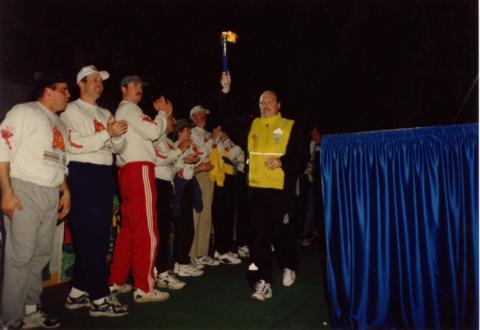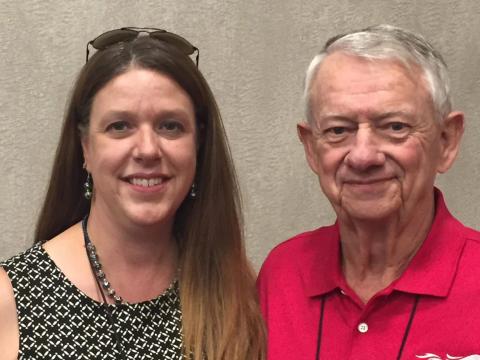When retired Toronto Police Service Const. Lorne White first heard about the Law Enforcement Torch Run (LETR) more than 30 years ago, he “knew nothing” about Special Olympics. Today, he’s one of the biggest champions of the movement in Canada.
The first-ever Law Enforcement Torch Run took place in Wichita, Kansas in 1981, spearheaded by then Chief of the Wichita Police Department, Richard LaMunyon. The event had five runners, including LaMunyon, who collected pledges and carried the torch to a local high school to light the flame and kick off a competition for Special Olympics Kansas. The run raised $300.
The LETR now exists around the globe, with more than 113,000 law enforcement members involved. It’s the largest public awareness and grassroots fundraising organization for the worldwide Special Olympics movement, raising tens of millions of dollars for programs each year. LETR in Canada raised $5.84 million in 2019 alone.
White heard about the LETR from LaMunyon himself at a 1986 police conference in Louisville, Kentucky. Inspired by the concept, White took the idea to the Metropolitan Toronto Police and, with the approval of his then Police Chief Jack Marks, organized Canada’s first Law Enforcement Torch Run the following year. The southern Ontario event consisted of 1,120 runners from 36 different law enforcement agencies. They ran 900-kilometres with the torch and converged on downtown Toronto to light the flame at Varsity Arena, officially opening the 1987 international floor hockey tournament.
After the successful run in Ontario, which raised $100,000, Toronto Police presented the idea to the Canadian Association of Chiefs of Police.
“All you ever had to do was see police officers run into an Opening Ceremony and receive an applause – when they never receive applause – to know how positive that is,” White said. “We had two national conferences in Toronto and had most of the provinces attend and that was the basis of the program starting in Canada.”
According to Paul Manuel, retired Calgary Police Service member and Past-Chair for LETR in Alberta, word of Ontario’s 1987 Law Enforcement Torch Run quickly made its way west.
“That sort of piqued the interest out here, so we did a run in Calgary in 1988,” Manuel recalled. “It just seemed to be a really good fit for being involved in the community as a police officer and so we took it on as a service-wide and eventually a province-wide initiative.”
After seven years as a runner, he got more involved at the organizational level, which lead to his former role as Provincial Director.
“It’s become a way of life,” said Manuel, also a longtime Special Olympics powerlifting coach. “My wife Theresa is also involved and we enjoy the people, the athletes, we enjoy the competition, we enjoy the camaraderie.”
According to Manuel, his involvement has not only made him “a better police officer – it made me a better person.”
Judy Cyr, Community Program Officer with RCMP in New Brunswick, joined the LETR her first day on the job six years ago.
“They told me about it and I immediately said, ‘I’m there,’” Cyr recalled.
“When you’re around Special Olympics athletes you cannot be sad, you cannot be miserable that day,” she said. “They will bring a smile to your face.”
While she organizes fundraising events in her community, she’s also working on getting more enforcement involved from Corrections Canada to Public Safety and the military.
“You don’t have to wear a uniform to join,” she said.
The LETR continues to run the Flame of Hope into the Opening Ceremony at local, Provincial, National and World Games, but has also evolved to include other year-round community-based fundraising events, like Tip-A-Cop, Plane Pulls, Polar Plunges and Truck Convoys.
LETR in Canada has raised more than $75 million since it started in 1987 and now has more than 13,500 members across the country – but they’re always looking for more law enforcement personnel to get involved.
“People want to do something that’s useful and you can see the results – the Torch Run will always show you those results,” said White. “You can be at the local level and see the athletes training, you can go to different levels of the Games and see them competing.”
“And if you stick around for a few years, you’ll see individual athletes blossom … that’s the real stuff.


